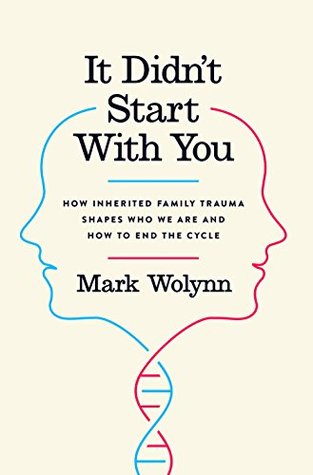More on this book
Community
Kindle Notes & Highlights
by
Mark Wolynn
Read between
April 21 - July 14, 2025
These imprints then become the family blueprint as family members unconsciously repeat the
sufferings of the past.
Hellinger teaches that everyone has the same right to belong in a family system, and that no one can be excluded for any reason whatsoever. This includes the alcoholic grandfather who left our grandmother impoverished, the stillborn brother whose death broke our mother’s heart, and even the neighbor child our father accidently killed as he backed out of the driveway.
and the firstborn daughter is likely to carry what remains unresolved with the mother, though this is not always the case.
For example, the first daughter might marry a man who is emotionally unavailable and controlling—similar to how she perceives her father—and, by doing so, share this dynamic with her mother.
These intangibles include self-awareness, the ability to self-soothe, and having a powerful internal healing experience.
More than a hundred years ago, the poet William Butler Yeats wrote that “wisdom first speaks through images,” and that if we just allow ourselves to be guided by the image that lives inside us, our souls will become “simple as flame” and our bodies will become “quiet as an
agate lamp.”
“Imagination is the beginning of creation,” wrote the playwright George Bernard Shaw in 1921.
This can happen at any time during our lives. We just need the right insights and tools.
we may find ourselves resorting to medications, comforting ourselves with food, cigarettes, sex, or alcohol, or distracting ourselves with mindless activities. As we know from personal experience, these paths always dead-end. They never take us where we need to go.
Long-term memory is often divided into two main categories: declarative and nondeclarative. Declarative memory, also called explicit or narrative memory, is the ability to consciously recall facts or events. This type of memory depends on language to organize, categorize, and store information and experiences that will later become retrievable memories. It’s like a book we can pull off the shelf when we need to refer to a story from the past. When we can put events into words, we can recall them as a part of our history.
The first is before the age of two or three, when the language centers of our brain have not yet reached full maturity.
We might want a career that’s meaningful, but fail to take the steps necessary to achieve
Guilt can freeze up our life force in myriad ways. And, when not owned or resolved, it can extend to our children and even to their children. You’ll read more about this in the
When we merge with a parent, we unconsciously share an aspect, often a negative aspect, of that parent’s life experience. We repeat or relive certain situations or circumstances without making the very link that can set us free.
The last thing parents would want to see is their child suffering on their behalf.
If this is true for you, have you also asked yourself what happened to her? What event had the power to interrupt the flow of love in your relationship? Did something occur that separated the two of you, or separated her from her parents?
Perhaps your mother carried a wound from her mother and was unable to give you what she didn’t get. Her parenting skills would be limited by what she did not receive from her parents.
Cutting off can make you feel free at first, but it’s the false freedom of a childhood defense. Ultimately, it will limit your life experience.
When we reject our parents, we can’t see the ways in which we’re similar. The behaviors become disowned in us and are often projected onto the people around us. Conversely, we can attract friends, romantic partners, or business associates who display the very behaviors we reject, allowing us myriad opportunities to recognize and heal the dynamic.
Perhaps your mother felt disconnected from her own mother when she was young or lost a sibling or was left by the great love of her life. She may not reveal her history and you may never know it.
Your job is to reconnect with the love you naturally felt for her when you were small.
Todd’s grandfather was a violent man. Not only did he beat his children, he also stabbed a man to death in a barroom brawl.
Children who share their parents’ pain generally do so unconsciously.
As we learned in chapter 3, the fates of family members who are rejected are often repeated.
These sentences affect the way you know yourself. They affect the choices you make. They affect how your mind and body respond to the world around you. Imagine the effect of a sentence like
As we learned in chapter 3, Bert Hellinger teaches that each of us is solely responsible for our fate, and that each of us alone must carry the consequences of that fate.
When people suffer deeply, they often attempt to distance themselves from their emotional pain by avoiding it.
Unconscious reliving can go on for generations.
When the connection with our mother flows freely, good health, money, success, and love can often seem to flow our way.
This misdirected expectation is a prescription for failure and disappointment. If our partner begins to act like
This profile is commonly associated with sociopathic and psychopathic behavior.
But what about those of us who never seem to achieve our goals no matter what we do or which plan we follow?
By unconsciously following in his footsteps, we establish a covert bond with him by sharing what is perceived as negative in him.
The later family member can stop short of accomplishing a major task in life, such as finishing a degree or closing a deal that would bring success. Procrastination can also stem from being connected to a family member’s early death.


